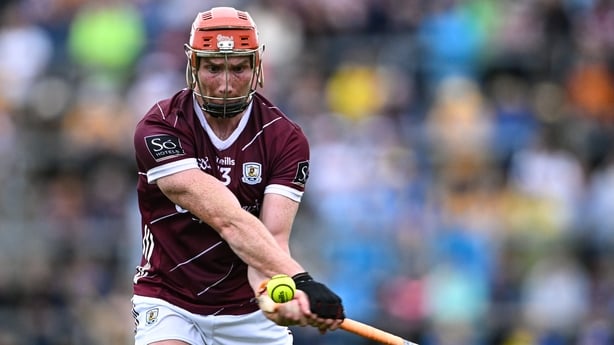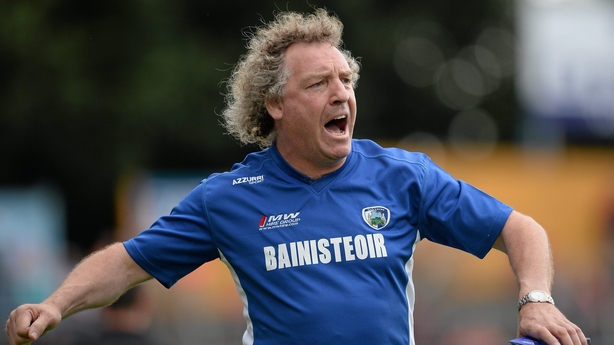In May 2020, Carlow IT Gaelic football head coach and former Laois dual star Pat Critchley was honoured by Basketball Ireland with a lifetime achievement award.
On a Wednesday in January that year, Critchley had managed Portlaoise's Scoil Chríost Rí to the Under-19 All-Ireland title in the afternoon, before guiding the Carlow IT footballers to their first Sigerson Cup final later that evening. They later lost to competition hosts DCU.
The only player from the O’Moore County to win a hurling All-Star award, Critchley is one of the top sports coaches in the land.
Yet at a time when Gaelic football and hurling are coming under the microscope for the cautious and almost stagnant nature of some games, Critchley’s message to improving spontaneity in matches is simple.
"There is pressure on coaches and managers at all levels, but you can’t overcoach the player," he says.
"You need to allow trust in players. A coach needs to allow the flair a player has to shine through. Don’t coach it out of them.
"In schools sessions we clock up 10 minutes and say 'this is the have-a-go game'.
"And that is simply what it is. A 10-minute period for players to cut loose and try things. Take the pressure off and let them express themselves. That’s what they are there for, as well as playing their roles in cohesive team units."
"I hear the debates, but I would also feel that skill and application levels have never been higher"
Critchley is aware of the narrative surrounding Gaelic games now - back-passing to goalkeepers, lateral hand-passing, a regression in kick-passing.
A report commissioned by the GAA this year shows that the average number of hand-passes per game increased from 251 in 2011 to 421 in this year's championship.
Despite the increase in hand-passing, there has not been a comparable slide in foot-passing. While kicking was on the decrease from 2011 to 2018, it has started to level off at approximately 130 passes per game.
Forward kick passes are down 9% in the past number of years. In 2011, for every foot pass there were two hand passes; in 2023 that ratio is 3.2 hand passes to every foot pass. Five years ago there were 11.1 passes to goalkeepers per game. Now it is 23.1 passes per game.
There is plenty of concern about the direction hurling is taking too, but that is not something that Critchley is overly worried about.
"In hurling, Christy Ring was the best of all time and he always maintained that the best hurlers were yet to come.
"In this year’s All-Ireland, I never saw anything like the exceptional skill technique and application of the Limerick hurlers.
"I never saw anything like it. I was constantly going; 'Jesus, did you see that?’ to the person beside me. All of this was against a Kilkenny team that was very competitive and scored a goal to go few points up in that game.
"So I hear the debates, but I would also feel that skill and application levels have never been higher."
At underage level, Critchley is slightly concerned, however.
"Short-term success is something that coaches have to be careful of and aware of," he says.
"Be careful of ego. You are trying to get team cohesion and you need players to fit in and do things for each other but also show that bit of flair.
"I worry when I hear coaches talk of ‘my team’ and ‘my lads’ or ‘I want my team to win the Under-12 title'.
"Sometimes that same coach will ask a corner-forward not to shoot on sight and be a team player but there is also the danger that the coach makes it all about them.
"I like hearing the word ‘we’. After all, coaches are on a journey with the players and long-term development simply has to come into it. I feel that the longer you coach, the better perspective you have. No one likes losing but it gives you perspective when you see improvements in individual teams as you progress."

Galway hurler and PhD candidate Conor Whelan recently expressed his concern that student athletes were being driven away from Gaelic games due to excessive demands on their time.
Whelan, a qualified secondary school teacher, is currently doing a PhD on third-level student well-being, having completed a Masters in psychology last year.
He is specifically looking at GAA student athletes and how they "balance 40 hours of academia with another 20-30 hours of sporting commitments".
"I've noticed that players are coming to the age of 18, 19 and packing it up," Whelan told 2fm's Game On in November. "Seventeen to 19-year-olds are the highest rate of dropout across sport in Ireland.
"The game has gone very physical and there's a major emphasis put on S&C but I think sometimes it is overkill. There is any amount of strength and conditioning, gym sessions and running sessions. As a young lad it was all about playing the game and enjoying it. I’m not so sure where it’s going, particularly at younger age groups.
"Some players I've looked at are playing for five teams, between Fitzgibbon or Sigerson, senior and Under-20 club and county.
"If you feel like it's a tough slog all the time, it’s very difficult for people to stay going. Enjoying your sport, at whatever age you are, I think is the most important thing of all. That's what keeps you going and keeps you coming back."
That balance conundrum is something that Critchley is acutely aware of.
"With IT Carlow [now SETU] the very first session and chat I had, I referenced playing with Thomond College in my own days.
"We are in our 40th reunion year and are still such a tight-knit bunch, everyone is the same age and [has] the same interests. In college you are mostly all living the same lives.
"It’s not like club and county where you have a 34-year-old and an 18-year old, married and single lads on the same team.
"In college, everyone is very close, and we were very sensible in our approach. If guys were on county teams it didn’t make a big deal of difference if they couldn’t do session with us.
"Once their attitude was good and once they were with us and put in a really good effort in training and games, we built spirit that way.
"We didn’t make big deal if a county U20 manager insisted the lads had to train with them. That’s not the young lads’ fault if the U20 manager was making a deal of it there was no big panic. But sometimes we make big deals about things."

All Critchley's knowledge, anecdotes, and musings have been incorporated into a new book.
A Coaching Way - Insights, Strategies and Tools for Successful Coaching is Critchley’s third book, following on from his memoir Hungry Hill, which was published in 2008, and Bruno, a collection of stories, yarns, and poems, which came out in 2019.
The book covers insights, strategies, and tools for successful coaching encapsulating over 40 years of his vast sporting memories.
Aside from becoming Laois’s first All Star in 1985, he also played Gaelic football and basketball to a high level and has coached a variety of teams, from his native Portlaoise GAA to Scoil Chríost Rí, where he worked as a PE teacher.
"People would always ask for drills or advice, and I’d try to help," he says. "Then people would say that I should have all this written down.
"So during the Covid lockdowns, I started putting it all down.
"A lot of the stuff was in my head so when the first lockdown came, I thought maybe I'll take a shot at transferring it from the head to the page. A few of the targets would be to give coaches an idea where everything fits. I loved writing it. I hope people take something from it."
It would be impossible not to.


